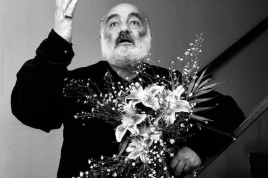Sergei Parajanov
Thursday, November 4, 2021
Sergei Parajanov (January 9, 1924 – July 20, 1990) was a Soviet Armenian film director, screenwriter and artist who made seminal contributions to world cinema with his films Shadows of Forgotten Ancestors and The Color of Pomegranates. Parajanov is widely regarded by many film critics, film historians, and filmmakers to be one of the greatest and most influential filmmakers in cinema history.
He invented his own cinematic style, which was out of step with the guiding principles of socialist realism; the only sanctioned art style in the USSR. This, combined with his lifestyle and behaviour, led Soviet authorities to repeatedly persecute and imprison him, and suppress his films. Despite this, Parajanov was named one of the 20 Film Directors of the Future by the Rotterdam International Film Festival, and his films were ranked among the greatest films of all time by the British Film Institute's magazine Sight & Sound.
Although he started professional film-making in 1954, Parajanov later disowned all the films he made before 1965 as "garbage". After directing Shadows of Forgotten Ancestors (renamed Wild Horses of Fire for most foreign distributions) Parajanov became something of an international celebrity and simultaneously a target of attacks from the USSR. Nearly all of his film projects and plans from 1965 to 1973 were banned, scrapped or closed by the Soviet film administrations, both local (in Kyiv and Yerevan) and federal (Goskino), almost without discussion, until he was finally arrested in late 1973 on false charges of rape, homosexuality and bribery. He was imprisoned until 1977, despite pleas for pardon from various artists. Even after his release (he was arrested for the third and last time in 1982) he was a persona non grata in Soviet cinema. It was not until the mid-1980s, when the political climate started to relax, that he could resume directing. Still, it required the help of influential Georgian actor Dodo Abashidze and other friends to have his last feature films greenlighted. His health seriously weakened after four years in labor camps and nine months in prison in Tbilisi. Parajanov died of lung cancer in 1990, at a time when, after almost 20 years of suppression, his films were being featured at foreign film festivals. In a 1988 interview he stated that, "Everyone knows that I have three Motherlands. I was born in Georgia, worked in Ukraine and I'm going to die in Armenia." Parajanov is buried at Komitas Pantheon in Yerevan.
Parajanov's films won prizes at Mar del Plata Film Festival, Istanbul International Film Festival, Nika Awards, Rotterdam International Film Festival, Sitges - Catalan International Film Festival, São Paulo International Film Festival and others. A comprehensive retrospective in the UK took place in 2010 at BFI Southbank. The retrospective was curated by Layla Alexander-Garrett and Parajanov specialist Elisabetta Fabrizi who commissioned a Parajanov-inspired new commission in the BFI Gallery by contemporary artist Matt Collishaw ('Retrospectre'). A symposium was dedicated to Paradjanov's work bringing together experts to discuss and celebrate the director's contribution to cinema and art.
Early life and films
Parajanov was born Sarkis Hovsepi Parajaniants (Սարգիս Հովսեփի Փարաջանյանց) to artistically-gifted Armenian parents, Iosif Paradjanov and Siranush Bejanova, in Tbilisi, Georgia; however, the family name of Parajaniants is attested by a surviving historical document at the Sergei Parajanov Museum in Yerevan. He gained access to art from an early age. In 1945, he traveled to Moscow, enrolled in the directing department at the VGIK, one of the oldest and highly respected film schools in Europe, and studied under the tutelage of directors Igor Savchenko and Aleksandr Dovzhenko.
In 1948 he was convicted of homosexual acts (which were illegal at the time in the Soviet Union) with an MGB officer named Nikolai Mikava in Tbilisi. These charges were later proven false. He was sentenced to five years in prison, but was released under an amnesty after three months. In video interviews, friends and relatives contest the truthfulness of anything he was charged with. They speculate the punishment may have been a form of political retaliation for his rebellious views.
In 1950 Parajanov married his first wife, Nigyar Kerimova, in Moscow. She came from a Muslim Tatar family and converted to Eastern Orthodox Christianity to marry Parajanov. She was later murdered by her relatives because of her conversion. After her murder Parajanov left Russia for Kyiv, Ukraine, where he produced a few documentaries (Dumka, Golden Hands, Natalia Uzhvy) and a handful of narrative films: Andriesh (based on a fairy tale by the Moldovan writer Emilian Bukov), The Top Guy (a kolkhoz musical), Ukrainian Rhapsody (a wartime melodrama), and Flower on the Stone (about a religious cult infiltrating a mining town in the Donets Basin). He became fluent in Ukrainian and married his second wife, Svitlana Ivanivna Shcherbatiuk (1938-2020), also known as Svetlana Sherbatiuk or Svetlana Parajanov, in 1956. Shcherbatiuk gave birth to a son, Suren, in 1958. The couple eventually divorced and she and Suren relocated to Kyiv, Ukraine.





